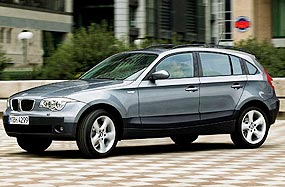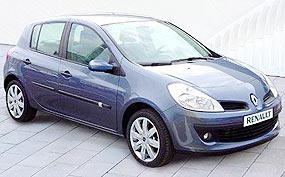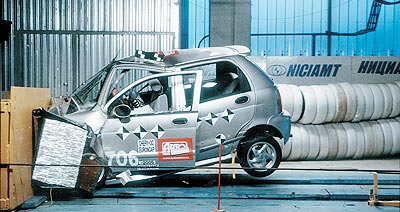BMW announces six new models
German carmaker BMW’s chairman, Norbert Reithofer, has
announced six new vehicles as part of their aggressive
approach to future marketing of its brands, with six new
models which the manufacturer hopes will see it sell 1.8
million vehicles globally by 2012.
 BMW
X1
BMW
X1
The projected new models come in the wake of
falling profits, and Reithofer stated that his objective is
to double its return on sales to between 8-10 percent by
2012.
BMW also predicts the premium segment will have grown by 40
percent by 2019, which is double the expected growth in the
same period for the mass market.
The first of these new vehicles is the X1, a ‘baby’
off-roader to add to the X3 and X5 luxury 4WDs. Adding to
this, there will be a Mini branded 4WD and a cheaper,
smaller Rolls-Royce. The other vehicles projected for the
future includes a four door based on BMW’s Concept CS, a
coupe version of the Rolls-Royce Phantom, and a new niche
vehicle BMW is calling a Progressive Activity Sedan.
Reithofer says the four door GT is based on the Concept CS
shown at the 2007 Shanghai motor show, which will replace
the 7-Series at the top of the BMW offerings. This new GT
will, however, share the same platform as the 7-Series and
will hit the marketplace to challenge the high performance
Mercedes-Benz CLS63 AMG and forthcoming Porsche Panamera.
Also on the new 7-Series platform is the proposed small
Rolls-Royce, smaller and cheaper than their current Phantom,
which is going to get a coupe version of the behemoth.
And just what is the Progressive Activity Sedan? It will be
a new market segment, according to Reithofer and is
described by BMW as a “unique interpretation of the sedan
offering a wide range of intelligent features”. Sounds as if
it has a “go to the shops on your own and get me a bottle of
milk” mode, as well as perhaps the self-parking capabilities
of the Volvo YCC concept. “Go park yourself,” being the
operative voice recognition command, I suppose.
BMW also confirmed the long-rumored X1 baby off-roader that
will sit beneath the X3 and X5 luxury 4WDs. This will very
likely share platforms with the Mini 4WD, and perhaps even
the 1-Series itself.
BMW has been muttering about buying another brand and some
pundits have been suggesting that cash-strapped Ford would
be willing to sell Volvo, however this is thought to be
fairly unlikely. “In principle, we will keep acquisitions on
our agenda. We defined clear criteria for potential
acquisitions within the scope of our strategic review. This
will allow us to act swiftly whenever necessary.”
And Renault follow suit
with another 12!
2008 looks like being a bumper year as the
manufacturers all try to grab whatever market share they
can, and for most of the Europeans this will be done by
enlarging their market to include India and China.
 Renault
Sandero
Renault
Sandero
Carlos Ghosn, the man who turned Nissan around and heads the
conglomerate of Renault and Nissan gave a taste of what is
forthcoming during a trip to Brazil, his birthplace. The
occasion was to reveal Renault’s first car made outside of
Europe to Brazilian President Luiz Inacio Lula da Silva.
Called the Renault Sandero, it is being built in a Brazilian
factory for the national market and for export to
neighboring South American countries.
Word was already out that Renault will be producing a budget
car for India (in India) to compete against the local Bajaj.
This will cost just 3,000 USD. “The big question is what
will have to be done to bring this car up to export quality.
It will have to be modified, sure - and what will be the
cost of these modifications so it’s viable? Logically,
Brazil would be a natural market for such a car,” Ghosn told
reporters in Brazil.
The question about how much it would cost to bring such a
low priced vehicle to export quality is a real one. Much was
made of the cheap and cheerful Chinese Chery which was going
to flood the western market until it failed miserably in the
compulsory crash testing required for Europe.
Renault’s overall worldwide sales figures have remained
stable (a drop of 0.1 percent only), but the numbers have
stayed up with Renault’s non-European sales which account
for 33 percent of production. In Brazil alone sales
estimates are for 73,000 vehicles by the end of this year.
Brazil “is one of the strategic markets (for Renault) for
the future, along with Russia, China and India,” Ghosn said.

You wouldn’t
walk away!
Autotrivia Quiz
Last week I asked which racing car was the first
Lotus rear-engined single seater? It was the Lotus 18.
So to this week. The first manufacturer to produce a million
cars in one year was Ford in 1922. When did the first
European manufacturer manage this, and what was the car?
For the Automania FREE beer this week, be the first correct
answer to email [email protected]
Good luck!
F1 - Four seats left -
put your money down now!
There are still four seats left with no driver in
the F1 line-up for 2008. However, you would have to be
fairly desperate to want to fill the four of them! It is
honestly a shame to see Fisichella openly hoping to get a
ride in a Force India. It’s the dizzy downward spiral of
failure, after coming from the team which won the
championship two years ago.
The four seats are Force India (two) and Super Aguri (two)
after the second McLaren one was filled. And you didn’t have
to be Einstein to work out which one was the plum ride.
At the time of going to press, the seat vacated by Alonso,
the sulky Spaniard, has gone to Heikki Kovalainen, who was
unceremoniously dumped by Renault, apparently because the
returning Alonso did not want another quick driver
alongside, after his loss of face against Hamilton this
year.
The other teams of Super Aguri and Force India are never
going to win anything, or even make the podium, unless 19
drivers manage to take themselves off in the biggest display
of mass hara-kiri ever known to mankind.
The teams that are settled are Ferrari (Raikkonen and Massa
as per 2007), McLaren (Lewis ‘wonderboy’ Hamilton and
Kovalainen), BMW (Heidfeld and Kubica unchanged from 2007),
Renault (Alonso and Piquet both ‘new’), Williams (Rosberg
and Nakajima as per end of 2007, with Hulkenberg as
test/reserve), Red Bull Racing (Coulthard and Webber as 2007
with both waiting for their pensions), Toyota (Trulli and
Glock with one a pensioner and the other a new face), Toro
Rosso (Bourdais and Vettel, which could surprise) and Honda
(Button and Barichello also lining up at the pensions desk
as they did in 2007).
Dark outlook for Asian
F1?
There has been an upsurge in interest in motor
sport in Asia, with now the manufacturers becoming involved
(Toyota and Honda in particular) and that is good. I believe
that Asian grass-roots motor sport is almost back up to the
pre-1997 economic crash levels, and will continue to get
stronger. So why the “dark outlook”?
The answer to this hinges on the fact that the F1 supremo,
Bernie Ecclestone, is pushing Asia into the dark, or into
the night at least. If you have been following the overseas
media, they have all been full of the fact that Ecclestone
has told the Melbourne Grand Prix promoters that if they
want the contract to run the Australian GP to continue after
2010, the race will have to be run at night. Singapore had
its hand up to run its new GP, and likewise they were told
it’s a GP under lights as well. Malaysia’s Sepang circuit
has also been told that the future for them in F1 is under
lights.
So why this pre-occupation with sport under lights, while
the rest of Asia is being told to cut down their use of
fossil fuels and electricity? Here’s our man Bernie, the
promoter of the top category of fossil fuel burners in the
world (and ignore the ‘green earth’ Honda F1 project, as it
was a publicity stunt and nothing else), now suggesting (or
even more than suggesting) that the circuits will have to
turn on its lights as well. And make no mistake, it is the
circuits that will have to provide the illumination. An F1
car cannot run with headlights on stalks popping up from the
bodywork.
Now night racing is not new, and in fact I was a regular
competitor at the Oran Park night race meetings in
Australia. There is something really exciting about running
in the dark, the exhaust crackles just that little bit more,
the car runs better in the denser air, and with your own
headlights carving through the blackness, it just adds that
new dimension. But that cannot work for F1, for the reasons
given above - they don’t have headlights.
So why is Bernie so adamant? The real reason is television
viewing figures. The interest in F1 has been waning over the
past few seasons. The numbers are down, because F1 is no
longer as exciting as it used to be. Overtaking? What’s
that? Unfortunately, “that” is what the fans want to see.
They want drivers fighting tooth and nail, passing and
re-passing. The entire gladiatorial contest. But they’re not
getting it!
But Bernie can see that by getting the viewing public in
Europe watching at the same mid-afternoon slot that they do
for the European rounds, even though the Grand Prix is in
Asia, that is the answer. This will mean the Asian races
will have to start around 7 p.m. local Asian time. When it’s
dark!
There are many problems to be overcome. Just take these
examples. The modern F1 car can easily do 300 km/h. I have
driven at that speed - in daylight - and you need perfect
vision and a bright sunny day to see all the imperfections
in the racing surface, oil on the racing line or slow
turtles. Don’t laugh, it has happened!
So how are the Grand Prix promoters going to be able to
supply that amount of illumination? Flood lighting must be
the way to go, but the lights themselves will have to be
high enough up that the drivers are not distracted by glare,
and believe me, the race helmet visor material and the
tear-offs are very much subject to glare.
It is also not an enclosed playing field, but several
kilometers of road that makes up a race track. The amount of
illumination needed would be very much greater than a
football field. And every bit of the track has to be
illuminated as good as daylight. This is certainly a
Herculean task.
However, an Australian company says it has produced the
lights, and now just waits for camera and action. So we have
the situation where Bernie wants floodlighting, but some
poor Asian promoter will have an enormous capital outlay,
for something that might not have a good return financially.
Who is going to take that risk? One thing’s for sure -
Bernie won’t!